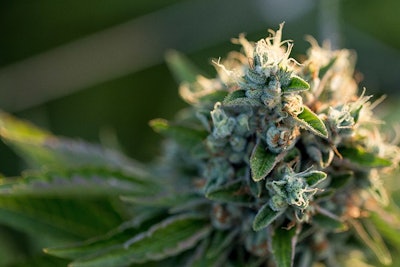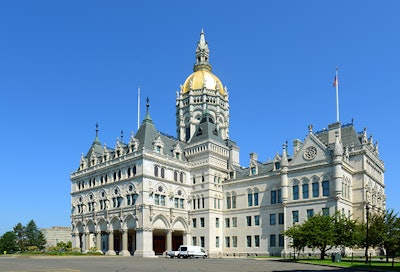
Cannabis reform is sweeping the country, from New Hampshire and Connecticut in the east to Wyoming and New Mexico in the west. While Nebraska Gov. Pete Ricketts and New Hampshire Gov. Chris Sununu have expressed opposition to medical and adult-use legalization measures (respectively), Connecticut Gov. Ned Lamont, New Mexico Gov. Michelle Lujan-Grisham and Illinois Gov. J.B. Pritzker have all expressed support for their states’ legalization efforts.
“From states on the east coast like Connecticut, where the new governor has openly advocated for legalization, to more conservative states like Kentucky, lawmakers across the nation are realizing more and more that they need to step up and take action, and if they don’t, they will lose their jobs,” NORML State Policies Coordinator Carly Wolf told Cannabis Business Times. “It is clear that reform is supported by the American public, regardless of where one stands on the political spectrum. Should these policies in other states have been ineffective or unfavorable, surely we would not be seeing this rapid increase in public and political support.”
Marijuana Policy Project (MPP) Communications Director Mason Tvert said: “This year has the potential to be the most productive year for marijuana policy ever in the state legislatures. That’s something that I find myself saying each year, but it’s no less true.”
From decriminalization measures to adult-use legalization proposals, here are the bills to watch as states enter their 2019 legislative sessions.
Tennessee: State lawmakers proposed three cannabis-related bills Jan. 29. State Sen. Sara Kyle (D-Memphis) and Rep. Gloria Johnson (R-Knoxville) introduced SB 260/HB 234, which would allow those with a valid medical marijuana card issued in another state to carry up to a half ounce of cannabis in Tennessee. Kyle also proposed SB 256 to decriminalize the possession of less than an ounce of marijuana, and Johnson sponsored the bill in the House. Kyle also introduced SB 257, which aims to change the definition of marijuana for tax purposes to match how it is defined in the criminal code.
Sen. Janice Bowling (R-Tullahoma) and Rep. Ron Travis (D-Dayton) plan to introduce legislation to create a new government commission to regulate Tennessee’s marijuana industry, according to a Tennessean report, and lawmakers have until late next week to file bills.
Illinois: State Sen. Heather Steans (D-Chicago) and State Rep. Kelly Cassidy (D-Chicago) say they plan to introduce a formal adult-use legalization bill soon in the Illinois Legislature, according to a State Journal-Register report. At a town hall-style meeting in Springfield Jan. 28, Stearns and Cassidy said the measure would allow adults 21 and older to purchase and possess up to 30 grams of marijuana, as well as grow up to five marijuana plants in their household. Marijuana “bars” would be prohibited under the proposal, and teenagers caught driving under the influence of cannabis would lose their licenses. The legislation would also expunge the records of citizens previously convicted of low-level marijuana possession and dealing, Cassidy said. The lawmakers said the estimated $350 to $750 million in annual tax revenue from a recreational marijuana program would fund community development of impoverished neighborhoods.
If the legislature passes the forthcoming bill, it has a good chance of being signed into law by Gov. Pritzker, who has expressed support for legalization.
West Virginia: Delegate Mick Bates (D-Raleigh) introduced HB 2331, legislation that would decriminalize marijuana and allow counties to approve its production and sale for adults 21 and older. The bill would legalize possession of up to one ounce or cannabis, and the State Bureau of Public Health would be responsible for permitting the production and sales facilities. Counties could levy a 5-percent sales tax on cannabis, and the Department of Revenue would supervise tax collection.
“It’s all past time [for] a serious debate about what opportunities this industry has for West Virginia,” Bates said, according to a Metro News report.
Minnesota: Sen. Melisa Franzen (DFL- Edina) and Rep. Mike Freiberg (DFL-Golden Valley) introduced Senate Bill 619 and House Bill 420 Jan. 28 to legalize recreational marijuana for Minnesotans 21 and older. Adults would be allowed to grow up to four plants at home, and the state would regulate growing operations and taxation.
Tim Walz, Minnesota’s newly elected governor and a former Congressman, is supportive of legislation and will likely sign the bill if it passes the state legislature, Wolf says. Sen. Franzen claims to have bipartisan support for the bill, Wolf adds, but some Senate Republicans, including the majority leader, are unsure if there is enough support to pass it in the Senate, and lawmakers are not considering it a priority. There are also two other competing legalization proposals that would have to receive voter approval in 2020, she says.
New Mexico: Democratic legislators introduced HB 356 Jan. 24 to regulate and tax adult-use cannabis sales for individuals 21 and older. The legislation would allow counties and cities to opt out of the market and levy a 9-percent tax on commercial cannabis sales.
Newly elected Gov. Lujan-Grisham has expressed support for legalization in the past.
“I am committed to working with the legislature to move toward legalizing recreational cannabis in a way that improves public safety, boosts state revenues and allows for New Mexico businesses to grow into this new market,” she said in a public statement during her gubernatorial campaign.
Wyoming: Republican House Majority Floor Leader Eric Barlow (R-Gillette) sponsored House Bill 278 to legalize medical marijuana in the state. The legislation would establish a tightly regulated system for the distribution and control of cannabis.
Nebraska: State Sen. Anna Wishart (D-Lincoln) introduced the Adopt Medical Cannabis Act in January (LB110). Right away, the Senate Judiciary Committee took up the cause and held a public hearing that garnered dozens of comments on both sides of the issue. The bill would limit medical cannabis possession to 3 oz. of marijuana on your person and 8 oz. at home.
In the late 1970s, first-time cannabis possession offenses were knocked down to a civil penalty (a fine), but other than that, no serious reform has been undertaken in the state. In 2016, state legislators rejected a medical cannabis bill that had made some headway; Gov. Pete Ricketts made his opposition to the bill known.
Sen. Matt Williams, a Republican, has also vocally opposed the idea of legalization, but he told the Omaha World-Herald that it may be politically efficient to pass a medical cannabis bill in the legislature before the voters can mount a ballot initiative. “We can keep saying, ‘Heck no, heck no, heck no!’ But at the end of the day, we could end up with something we really don’t want,” he said.
New Hampshire: State Rep. Renny Cushing (D-Hampton) introduced an adult-use legalization bill (HB 481) last month, which would allow possession of up to one ounce of cannabis. The bill would also set up a commission to determine and oversee taxes and regulations for a cannabis market in New Hampshire.
The Governor’s Commission on Alcohol and Other Drugs, meanwhile, announced its opposition to the bill just a few weeks later. Last year, Gov. Chris Sununu said he would “absolutely” veto any attempt to legalize cannabis in the Granite State.
Legalization attempts in New Hampshire have thus far proven difficult for a state that’s surrounded by implicit political pressure. “It’s certainly a possibility, but it might require an override of the [governor’s] veto,” Tvert said.
South Carolina: Sen. Tom Davis (R-Beaufort) and Rep. Peter McCoy (R-Charleston) introduced companion bills in January to legalize medical cannabis, with Davis calling the legislation (SB 366) the most socially conservative medical marijuana bill in the country, according to a recent WIS News report. The bill would not allow flower, instead giving patients access to capsules, oils and edibles.
Even still, in the face of bipartisan support, the state’s attorney general has called cannabis “the most dangerous drug in America.” South Carolina Law Enforcement Division Chief Mark Keel joined him at a speech this week and said, “Never have I seen a piece of legislation that has the potential to change South Carolina in a negative way as this legislation does.”
Kentucky: State Sen. Jimmy Higdon (R-Lebanon) introduced a bill in Kentucky to decrease the penalty for cannabis possession to a $100 fine (or 15 hours of community service). Possession for personal use includes amounts of cannabis up to one ounce. SB 82 is a step toward cannabis reform in a state that’s otherwise on the vanguard of hemp cultivation and innovation in the U.S.

Connecticut: Connecticut’s 2019 attempt at adult-use cannabis legalization comes with the support of 40 statehouse Democrats already—and a sympathetic governor. Retail sales in neighboring Massachusetts have applied some pressure to Connecticut politicians interested in opening a new tax revenue spigot.
Like other states, including Michigan, licensed medical cannabis businesses would have the first crack at obtaining an adult-use license in the state. Built into the bill are social equity clauses, like expungement of cannabis-related convictions and tax-revenue funding for substance abuse treatment programs.
The grand showing of support so far for this bill makes Connecticut one of the top U.S. prospects for legalization this year.
“I think the adult-use states that are really the most high-profile and likely to move along right now are Illinois and Connecticut, … and New Hampshire, New Mexico and Minnesota are certainly all on the map, as well,” Tvert said.


























